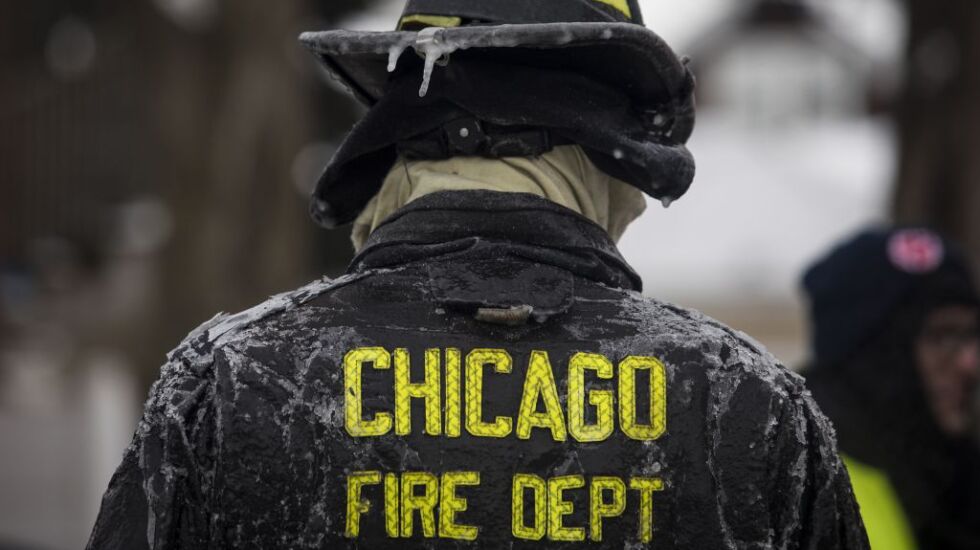
More than 8,157 applicants — 57.7% of them Black and Hispanic, 15.7% women — have already applied to take Chicago’s first firefighters entrance exam since 2014.
Testifying Friday at City Council budget hearings, Human Resources Commissioner Chris Owen said another 12,638 people have started an application but not finished.
The exam will be only the fourth the department has administered in 44 years.
With additional recruiting events scheduled before the Oct. 17 application deadline, Owen said he’s “pretty sure we’re gonna get closer to the 20,000 number that we typically see” for a Chicago Fire Department entrance exam.
So far, the 8,157 applicants include: 6,747 males (82.7 percent); 1,281 females (15.7 percent) and 129 applicants who did not identify their gender.
The applicant breakdown so far: 2,677 (32.8%) are white; 2,077 are Black (25.4%); 2,632 are Hispanic (32.2%); 113 are Asian-Americans (1.3%).
Ald. Nicole Lee (11th), the first Chinese-American and second Asian American to serve on the council, said she was “really disturbed by the tiny number” of Asian Americans in the applicant pool.
“I’d like to see a bigger, more intentional plan around that. Clearly there are plans in other communities and this one’s obviously been overlooked at this point,” Lee said.
“Very disappointing because we have such a small number of firefighters within the department right now. And we need to be able to recruit new ones — especially with the language-access needs there are across the city.”
Last year, Annette Nance-Holt became the first woman to serve as fire commissioner in the 162-year history of the department.
She promptly vowed to diversify a department with a long, documented history of discrimination through “vigorous recruitment in communities of color,” outreach to high school students in “under-represented communities” and by scheduling an exam no later than early 2022.
Well, better late than never.
The entrance exam will be held in December, with plans for exams to be held every two years after that.
But Owen said the rules have changed to reduce the costs that made more frequent testing too expensive.
Instead of having all applicants take the test, the city will use a lottery to choose 4,500 exam-takers, with 80% of those spots reserved for Chicago residents.
If the lottery doesn’t produce an exam pool with enough city residents, “you start pulling people in and pushing people out who aren’t city residents,” Owen said.
Budget Chair Pat Dowell (3rd) asked what happens if “everybody is male” after the 4,500 test-takers are chosen.
“We’re not explicitly allowed under the law to take that into account,” Owen said. “However, the goal again is to get as much diversity in the applicant pool as we possibly can. And we are seeing better diversity numbers than we have in the past with the recruitment campaign.”
The new approach is expected to save the city $3.5 million, making the ambitious goal of holding a firefighters entrance exam every two years not only realistic, but achievable.
Administering smaller and more frequent tests will also pave the way for the city to “align the size of the applicant pool” to the Chicago Fire Department’s “actual hiring needs,” giving test-takers “more realistic expectations” about if and when they can expect to be hired, Owen said.
“We want to go out as frequently has possible. But, people can say, `You still have thousands and thousands of people on that list.’ We really needed to change this. Getting to a model where we’re posting every two years to keep this list fresh — in order to get there, we needed to [be] testing fewer people,” he said.
But that lottery-first approach did not sit well with Ald. Chris Taliaferro (29th), chairman of the council’s Committee on Public Safety. He called it “disadvantageous to the Black community and the Latino community.”
“If they signed up for the test, they should be given an opportunity to take the test. Let it be determined whether or not they can be firefighters or EMT’s based on their merit — not based on the lottery,” Taliaferro said.
Otherwise, “that eight-year wait becomes another two years — if the city does follow through on testing in another two years. I even have doubt about that.”







